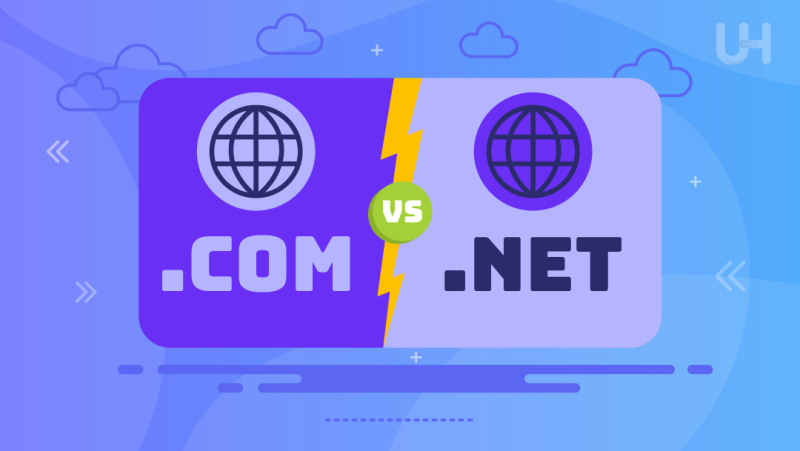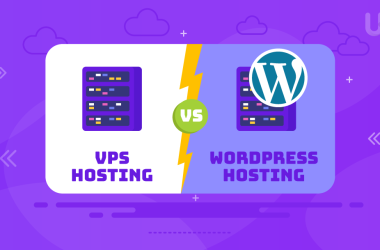Establishing a commanding presence in the digital ecosystem is important for companies, organizations, and even personal brands. Selecting an appropriate domain name is an integral part of making sure this presence is felt online. A domain name signifies your unique identifier on the web, but it is at the same time very important for your identity, branding, reputation, and image online. The ending of your domain name, or the top-level domain (TLD) as it is known, can greatly affect your website’s impression by potential visitors and search engines.
.COM and .NET are two of the most frequently used domain name extensions available. But the conflict of uses between the two is bound to leave some people confused regarding which is the more appropriate option. Can .COM always be the dominating preference or are there occasions where .NET can prove to be more suitable?
As you embark on constructing a fresh website or contemplating a new identity, differentiating the subtleties of the two TLDs will help tailor your requested domain extension to your intended goals.
What is a Domain Extension?
A domain extension is synonymous with top-level domain (TLD), referring to the part of a domain name that comes after the last dot. Domain extensions classify websites by purpose, geography of organization. Collectively, the extensions provide search engines and users insight into what kind of a site they are visiting.
Domain extensions are important in helping computers identify and interact with websites in the Domain Name System (DNS). If you enter a domain name in a web browser, DNS resolves that domain name to an IP address, enabling the web browser to access the appropriate web server that contains the pertinent website.
Types of Domain Extensions
- Generic TLDs (gTLDs): These are the most common types of domain extensions and are not geographically based on any nation or area. Examples include .COM, .NET, .ORG, .INFO Domain, and .BIZ Domain. Generic TLDs are commonly used for broad uses such as commercial websites (.COM), network infrastructure (.NET), and non-profit organizations (.ORG Domain). It further includes Informational websites (.INFO) and businesses (.BIZ).
- Country code TLDs (ccTLDs): These domain extensions are allocated to countries or regions. They are frequently utilized to show the location or intended audience of a website. Examples include .US Domain (United States), .UK Domain (United Kingdom), .DE Domain (Germany), .CN Domain (China), .JP Domain (Japan).
- New gTLDs: With the introduction of new generic top-level domains, there has been an expansion in the domain name system. These new gTLDs provide website owners with additional choices to select from. It can be more creative or descriptive in nature. Its Examples are .APP Domain, .SHOP Domain, .BLOG Domain, .TECH Domain, and .ONLINE Domain.
One must look beyond the basic domain name structure in order to tailor a new project on a website. It is prudent to evaluate the scope of the domain and also keep in mind the intended audience, marketing goals, as well the overall purpose of the website is essential to form a strategy.
Overview of .COM
.Com domain extension is one of the original top level domains that was implemented in 1985 as part of the Domain Name System (DNS). It was originally designed for commercial entities which is the reason why it’s abbreviated as “COM” which signifies “Commercial.”
.COM was developed in order to classify commercial websites separately from other types of online entities like educational institutions (.EDU), government agencies (.GOV), and network infrastructure (.NET). Over the years, the .COM domain extension has become the most widely used and recognized TLD on the internet. It enjoyed massive growth because it is associated with commercial activities and later on it was adopted by various businesses, organizations and individuals.
Advantages of .COM
- Trust and credibility: Websites that have a .COM domain extension are regarded to be more credible and trustworthy by internet users. This is for the reason that .COM domains are widely used domains by various businesses.
- Remember and Type With Ease: Domains with a .COM extension are renowned to be easier to memorize and enter into a browser compared to other TLDs. As a result, they have better usability, and are more likely to receive traffic from users who utilize the address bar or directly type the domain.
- Popular: The majority of users are familiar with the .COM domain extension which is the by default one for most websites. It is a part of internet culture, and is set as default for many searches as well as web addresses. This recognition makes .COM domains extremely favorable when trying to establish a mark on the internet.
Common Uses of .COM
- E-commerce Websites: Numerous online retailers and e-commerce platforms alike, utilize .COM domain names for their websites. The .COM extension works best for businesses that provide services and sell products as it indicates commercial intent.
- Business Websites: Numerous businesses from all types of industries actively use .COM domains for their official websites. From a small local business to a multinational company, having a .COM extension shows professionalism and strengthens legitimacy.
- Personal Blogs: The .COM domain is also widely used by people looking to set up personal blogs or portfolio websites. A personal website using the .COM extension can greatly enhance a person’s personal brand and make it easier for visitors to memorably find the website.
Secure Your Perfect Domain Name Today!
Want to create a strong presence on the internet? Don’t waste time looking elsewhere. Visit Ultahost and register your .COM domain with us today. Ultahost has the best prices, customer support, and an easy registration process.
Overview of .NET
In .NET, the domain extension was created in 1985, coming together with other original top-level domains, as a part of the Domain Name System (DNS). Unlike .COM which was intended predominantly for commercial use, .NET was created with a specific focus on networking and technical infrastructure.
The .NET domain was specifically created for network services, telecommunications, and technical infrastructure companies. It has a designated namespace for entities that are into networking and their correlative areas of work.
Although .NET is not as common as .COM, it is still widely accepted and used, especially by technology companies. Many tech companies, service providers, and infrastructure companies prefer .NET domains due to their technical nature.
Advantages of .NET Domain
- Different Website Genres: Even though the initial intention of .NET was focus on networking and infrastructure,, it has evolved to accommodate and prove versatile for different website genres including business sites, personal blogs and informative portals. Thus making it a flexible option for different online ventures.
- Preferred Alternative for Domains with .COM Extensions: One of the major benefits of .NET is that it is still available especially when the desired .COM domains are already taken. It gives assurance to businesses which need a domain name that they can still obtain a relevant .NET domain.
- Ideal for Tech-Based Sites: In line with networking and technical infrastructure, .NET domain is more appropriate for technology, telecommunications, software development, and internet service oriented websites. The use of .NET can enhance the image of expertise of such websites.
Common Uses of .NET
- Internet Service Providers: A lot of internet and telecommunication companies use .NET domains for their websites. This is because .NET fits the nature of their business and emphasizes marketing of their services to the customers.
- Networking Companies: In-depth specialists involved in developing networking technologies, network security, data centers, and cloud infrastructure are known to use .NET domains as a sign of their focus on more technical and solution-oriented frameworks.
- Web Hosting Services: Certain web hosting companies, along with IaaS (Infrastructure as a Service) providers, use .NET domains for their sites to identify themselves as providers of hosting and technical infrastructure services to the commercial and residential markets.
Get Your .NET Domain Today!
Are you keen on creating your unique identity on the internet with a domain that is flexible and tech-oriented? Head right now to Ultahost for registration of your .NET domain. You will love their pricing, customer service, and the ease of registration.
COM vs NET: Key Differences
COM vs NET: Purpose and Intended Use
What distinguishes .COM and .NET is the intended domain use. .COM is chiefly utilized for commercial activities and business ventures, whereas .NET caters for services related to networks, infrastructure and other technical domains. It is this intention that drives the perception branding for each domain extension.
COM vs NET: Perception and Branding
The perception of .COM as a default option stems from its historical and prevalent adoption. To put it differently, .COM is generally affixed to all forms of websites regardless of their nature or industry. Internet users ascribe more trust, legitimacy, and established nature to websites with a .COM domain. This is because reputable businesses and organizations around the world have extensively used .COM domains.
.NET domains are more closely associated with technological networking companies and technical infrastructure service providers. Domains with a .NET extension may suggest specialization and focus as well as a deep understanding of network services and technology solutions. This focus can be beneficial for businesses in the tech sector who wish to strengthen their branding in the technologically advanced areas.
COM vs NET: Availability and Cost
The high demand for .COM domain names has translated into ever-increasing prices for attractive domain names. Premium .COM domains are often short, simple, or consist of commonly used phrases, and as such, they sell for very high prices in the domain name market. Besides, due to the exponential growth of .COM domain registrations, some businesses may struggle to obtain a relevant .COM domain name.
On the other hand, .NET domains tend to have greater availability than .COM. The .NET market is less saturated and more narrowly focused, so there is generally a greater selection of domain names that are available. This can be beneficial for companies that wish to register a particular domain name. In addition, establishing a brand identity is important without the limitations of .COM availability or cost.
How to Choose Between .COM and .NET

Consider Your Business Type and Goals
When deciding on getting a .COM or a .NET domain, think about your business and its objectives. In case your business is more commerce or service oriented, .COM may work better for you. On the other hand, if your work dealsmore with technology, networking or technical infrastructure, then opting for .NET would be a better choice.
Branding and Marketing Considerations
Both domains, .COM and .NET can be useful for branding as well as SEO purposes. Regardless of the perception gap by users or search engines, both domains can be helpful in positive branding. Furthermore, think about how the specific domain extension you choose affects your brand perception, identity, marketing strategies, and overall advertisement success. Along with this, consider the impact on brand recognition and user trust that stems from the choice of domain extension.
Availability and Future Expansion
In an ideal world, companies would likely want to purchase both .COM and .NET versions of their domain name so that their brand is not automatically associated with other competing brands and users do not get confused. While requiring further investment initially, in the long run, purchasing both domains can protect your brand from unscrupulous competitors and cyer squatters while also providing room for scaling or branding enhancements.
COM vs NET: Examples and Case Studies
Numerous Successful Brands Operating on .COM: A plethora of successful companies and enterprises are using .COM domains as their online flagship stores. Examples include Amazon.com, Google.com, Microsoft.com, Apple.com. They make use of .COM domains to cement industry presence and further enhance brand visibility along with increased heightened recognition derived from their market dominance.
Successful Companies Using .NET: Equally, many other successful companies tend to operate on .NET domains, especially in the networking, technology, and infrastructural domains. Example include Microsoft.NET. These companies uses .NET domains to leverage the branding power offered by network services associated with such domains to directly advertise their prominence to the right audience.
.NET vs .COM: Pros and Cons
.COM Domain Pros
- Credibility: .COM domains are most likely the first domain that comes in mind when a consumer thinks of a business due to their high brand recognition. As such, pairing .COM domains to your business can boost it’s credibility and brand trust immediately.
- Recognition: Internet users are familiar with the .COM domain, which is why it is the most widely used domain extension. This also aids in memorability and ease of typing.
- SEO Benefits: In terms of SEO value, .COM domains may present some minors benefits. Search engines seem to trust them more, leading to increased click-through rates and lower search result positions.
.COM Domain Cons
- High Competition: As a result of their popularity, desirable .COM domain names face tough competition. Their acquisition may require a considerable amount of capital.
- Cost: Purchase prices for premium .COM domains are often inflated in domain resale markets. This adds to their denial for some businesses operating on limited financial resources.
- Limited Availability: The saturation of .COM registrations makes it difficult to find an appropriate and available domain name. This is especially true for keyword rich domains for specific businesses.
.NET Pros
- Versatility: Unlike technical or networking focused entities, any type of website can make use of .NET domains. This grants .NET domains a large range of applicable use and versatility.
- Availability: Domain availability is greater than that of .COM domains, leading to greater selection and ease of meeting user needs with available domain names.
- Suitable for Tech: .NET domains are ideal for technology focused websites, networking firms, and businesses dealing with technical infrastructure.
.NET Domain Cons
- Less Recognition: Despite having a pool of users in the technology field, .NET domains do not enjoy the same default, automatic recognition as .COM domains.
- Possible Problems With Branding: For businesses not in the technology field, getting a .NET domain can be problematic from a branding perspective. In addition, for those hoping to appeal to a wider target market, the extension may suggest a certain technical specialization.
Practical Tips for Securing a Domain
Checking Availability
Many online applications and the websites of domain registrars offer functionalities that help in confirming if a particular domain name is free. WHOIS database services provide such apt domain search features.
Registering Your Domain
- Selecting a Domain Registrar: Start with Domain Name Registration. Ensure that the domain registrar matches your needs and specs as different registrars have differences in pricing, services, customer support quality, and ease of wielding which will affect their value for you. Make a research using comparison sites.
- Search Using A Domain Name Of Your Choice: Upon selection of the registrar, curate the list of domain name registrars using the registrar’s domain search tool. The registrar’s system queries the name across all the TLDs. If not available, they may offer optional or programmatic solutions.
- Add Domain Name To Your Cart: Select and confirm that the name is actually free, and further, crosscheck the specifics to verify accuracy. Note additional features some registrars may offer during the registration process. Add optional features like privacy protection or email forwarding if needed.
- Complete Registration: Submit a payment method contact details to finish the registration step. Registrars normally need basic details which include your full name, address, email ID, and contact number. Moreover, you have to choose a registration term from 1 year up to several years and make the payment using your preferred payment method.
- Set Up DNS Settings: After your domain registration is complete, you should set up the Domain Name System (DNS) settings for the domain so that it is directed to your web hosting company/server. This step makes certain that users who type your domain in their browsers will be taken to the right website. You may also need to change the domain’s nameservers or DNS records depending on the hosting provider and registrar you are using.
Conclusion
An important part of maintaining a firm’s online presence is to select domain extensions strategically. .COM and .NET comparisons have demonstrated that .COM is well recognized and marks existing businesses as credible, albeit more expensive and competitive over time. NET marks tech oriented ventures due to its versatility and increased brand availability.
The most appropriate domain to use is dictated by the nature of the business, branding strategy, and domain availability. In any case, registering different top level domains (TLDs) alongside trademark searches will bolster brand security. Your business will flourish if you make these strategic decisions.
Get a website SSL certificate from UltaHost and secure your website now! With UltaHost, you get guaranteed resource exclusivity on powerful servers with high end resources. Select the best option based on your requirements!
FAQ
What is the difference between a domain name and a domain extension?
A domain name is the unique web address of a website, while a domain extension (TLD) is the last part of the domain, like .COM or .NET, indicating the website’s category.
Why are .COM and .NET domains popular?
.COM and .NET are popular due to recognition and credibility. A .COM is for businesses and .NET is for tech.
Can I switch domain extensions after registering a domain?
Yes, but it’s complex and can affect SEO and branding negatively.
Are there restrictions on domain registration?
Yes, including character limits and trademark considerations.
How can I protect my brand when registering a domain?
Register multiple TLDs and do a trademark search.











